BSB51918: Emotional Intelligence and Program Management Analysis
VerifiedAdded on 2022/09/27
|19
|3807
|29
Homework Assignment
AI Summary
This assignment delves into the application of emotional intelligence within a program management context, focusing on how a manager can leverage their emotional intelligence to mitigate the impact of their emotions on others in the workplace. It explores personal strengths and weaknesses, emotional triggers, and various workplace behaviors, including aggressive, assertive, and passive responses. The assignment details the development of emotional intelligence through experience and remuneration, providing examples of how emotional intelligence is used in the workplace, such as responding to coworkers' emotional states and demonstrating flexibility. The assignment further examines how to promote emotional intelligence in others, encouraging a positive emotional climate, and the achieved workplace outcomes such as improved teamwork, confidence, and efficiency. The second part of the assignment focuses on the individual's emotional strength, including adaptability and learning attitudes. It also includes two workplace scenarios: one where emotions were lost and another where emotions were successfully managed. These scenarios involve self-reflection and feedback to evaluate the development of emotional intelligence, specifically in a fast-moving consumer goods company.
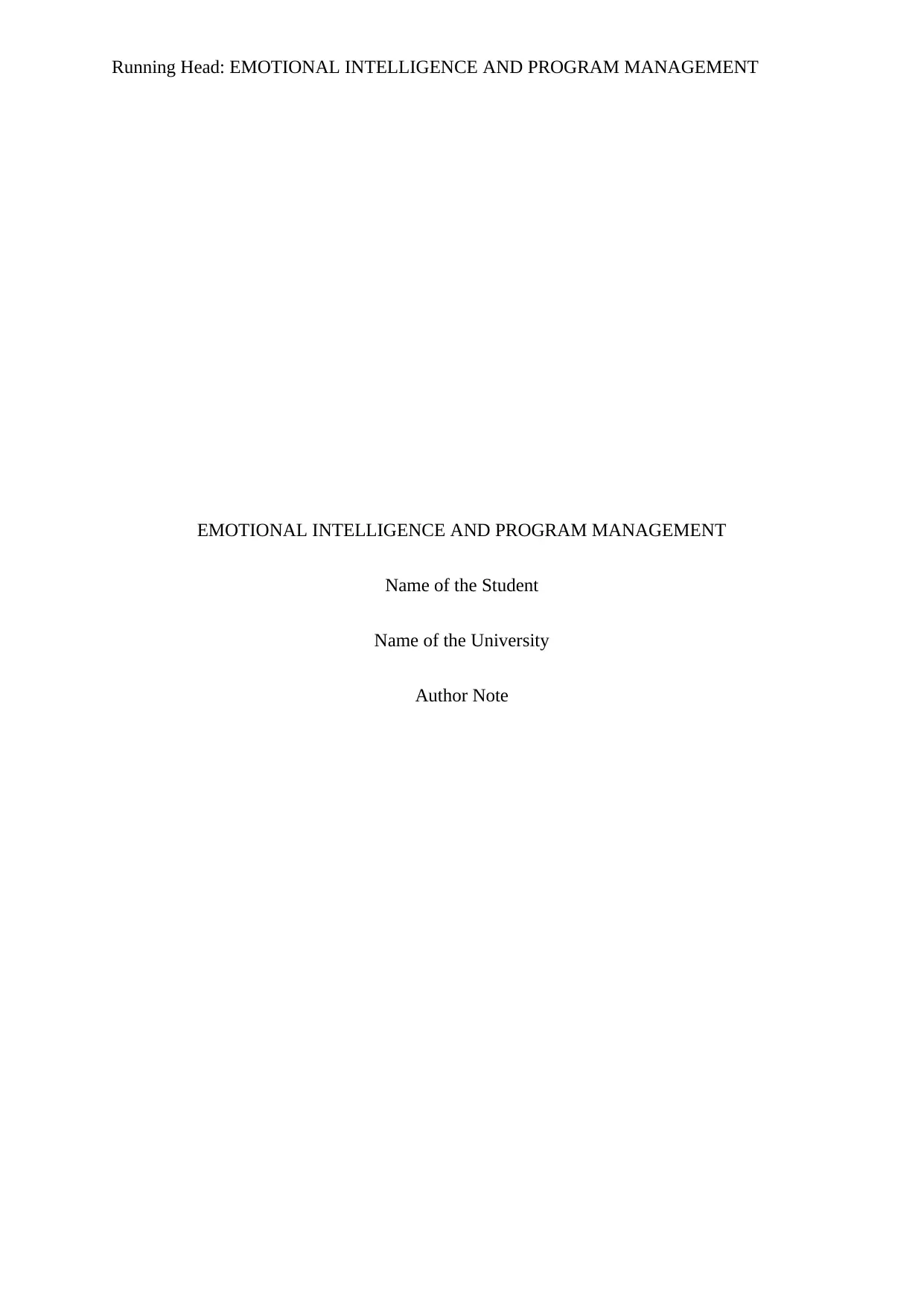
Running Head: EMOTIONAL INTELLIGENCE AND PROGRAM MANAGEMENT
EMOTIONAL INTELLIGENCE AND PROGRAM MANAGEMENT
Name of the Student
Name of the University
Author Note
EMOTIONAL INTELLIGENCE AND PROGRAM MANAGEMENT
Name of the Student
Name of the University
Author Note
Paraphrase This Document
Need a fresh take? Get an instant paraphrase of this document with our AI Paraphraser
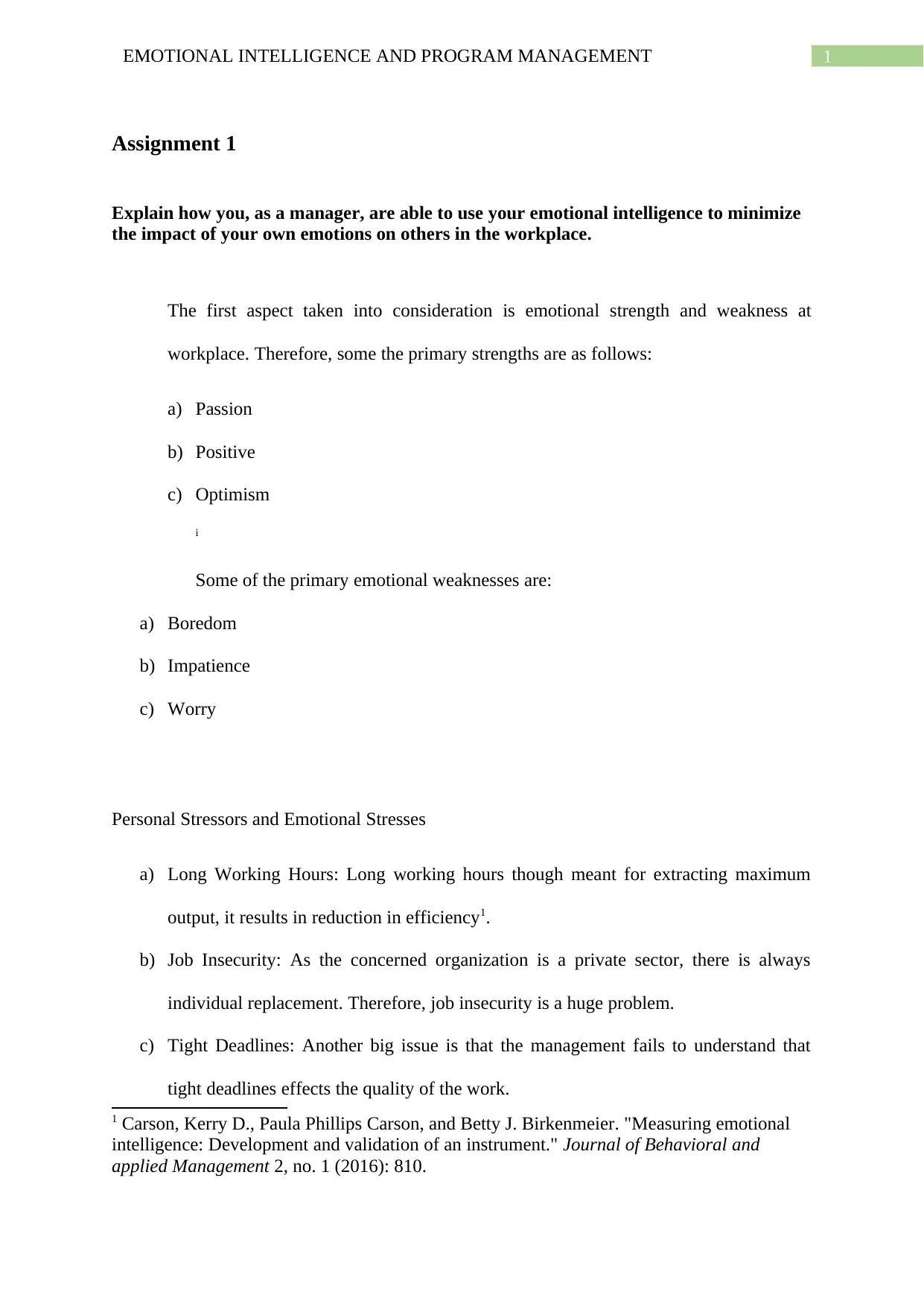
1EMOTIONAL INTELLIGENCE AND PROGRAM MANAGEMENT
Assignment 1
Explain how you, as a manager, are able to use your emotional intelligence to minimize
the impact of your own emotions on others in the workplace.
The first aspect taken into consideration is emotional strength and weakness at
workplace. Therefore, some the primary strengths are as follows:
a) Passion
b) Positive
c) Optimism
i
Some of the primary emotional weaknesses are:
a) Boredom
b) Impatience
c) Worry
Personal Stressors and Emotional Stresses
a) Long Working Hours: Long working hours though meant for extracting maximum
output, it results in reduction in efficiency1.
b) Job Insecurity: As the concerned organization is a private sector, there is always
individual replacement. Therefore, job insecurity is a huge problem.
c) Tight Deadlines: Another big issue is that the management fails to understand that
tight deadlines effects the quality of the work.
1 Carson, Kerry D., Paula Phillips Carson, and Betty J. Birkenmeier. "Measuring emotional
intelligence: Development and validation of an instrument." Journal of Behavioral and
applied Management 2, no. 1 (2016): 810.
Assignment 1
Explain how you, as a manager, are able to use your emotional intelligence to minimize
the impact of your own emotions on others in the workplace.
The first aspect taken into consideration is emotional strength and weakness at
workplace. Therefore, some the primary strengths are as follows:
a) Passion
b) Positive
c) Optimism
i
Some of the primary emotional weaknesses are:
a) Boredom
b) Impatience
c) Worry
Personal Stressors and Emotional Stresses
a) Long Working Hours: Long working hours though meant for extracting maximum
output, it results in reduction in efficiency1.
b) Job Insecurity: As the concerned organization is a private sector, there is always
individual replacement. Therefore, job insecurity is a huge problem.
c) Tight Deadlines: Another big issue is that the management fails to understand that
tight deadlines effects the quality of the work.
1 Carson, Kerry D., Paula Phillips Carson, and Betty J. Birkenmeier. "Measuring emotional
intelligence: Development and validation of an instrument." Journal of Behavioral and
applied Management 2, no. 1 (2016): 810.
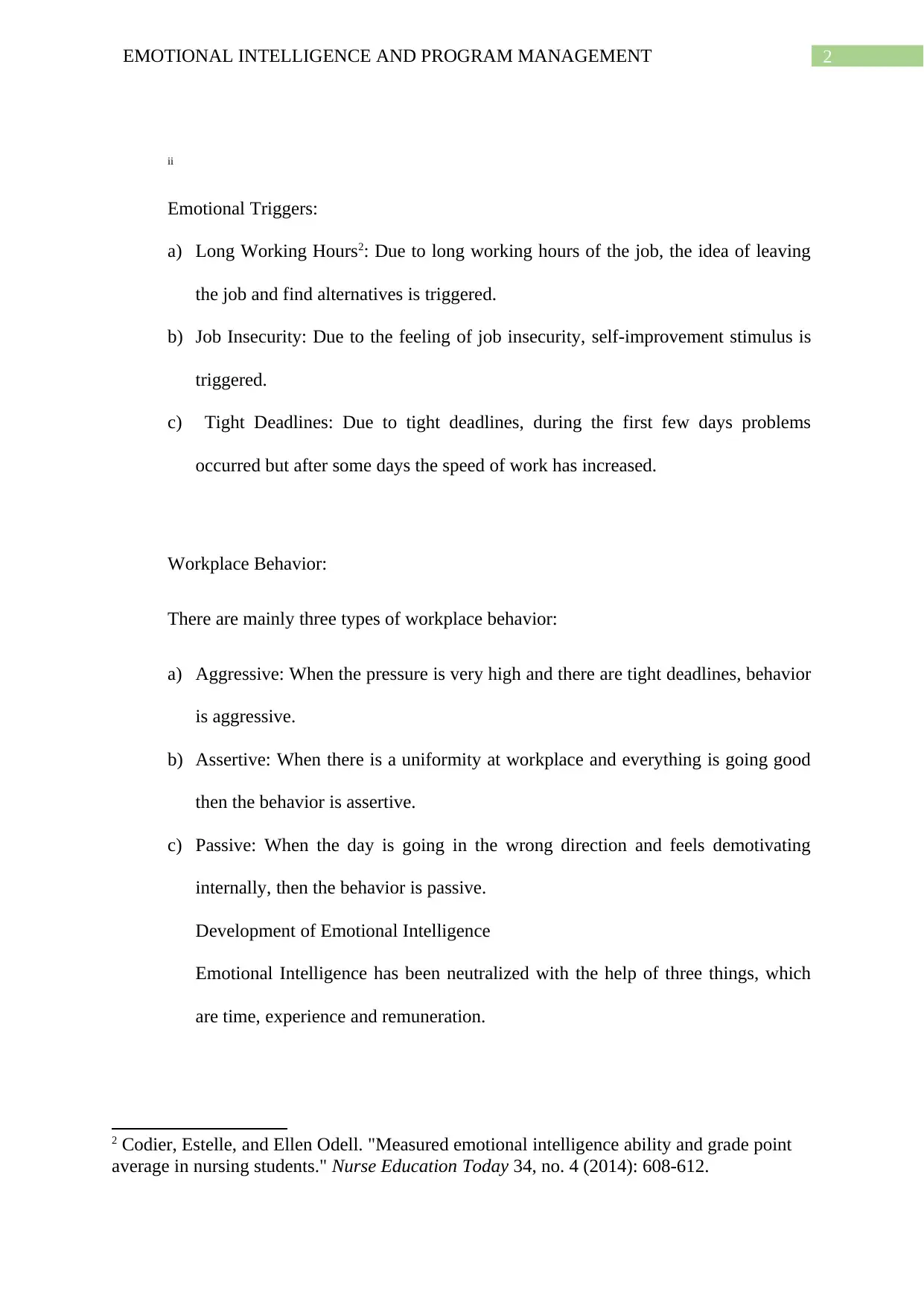
2EMOTIONAL INTELLIGENCE AND PROGRAM MANAGEMENT
ii
Emotional Triggers:
a) Long Working Hours2: Due to long working hours of the job, the idea of leaving
the job and find alternatives is triggered.
b) Job Insecurity: Due to the feeling of job insecurity, self-improvement stimulus is
triggered.
c) Tight Deadlines: Due to tight deadlines, during the first few days problems
occurred but after some days the speed of work has increased.
Workplace Behavior:
There are mainly three types of workplace behavior:
a) Aggressive: When the pressure is very high and there are tight deadlines, behavior
is aggressive.
b) Assertive: When there is a uniformity at workplace and everything is going good
then the behavior is assertive.
c) Passive: When the day is going in the wrong direction and feels demotivating
internally, then the behavior is passive.
Development of Emotional Intelligence
Emotional Intelligence has been neutralized with the help of three things, which
are time, experience and remuneration.
2 Codier, Estelle, and Ellen Odell. "Measured emotional intelligence ability and grade point
average in nursing students." Nurse Education Today 34, no. 4 (2014): 608-612.
ii
Emotional Triggers:
a) Long Working Hours2: Due to long working hours of the job, the idea of leaving
the job and find alternatives is triggered.
b) Job Insecurity: Due to the feeling of job insecurity, self-improvement stimulus is
triggered.
c) Tight Deadlines: Due to tight deadlines, during the first few days problems
occurred but after some days the speed of work has increased.
Workplace Behavior:
There are mainly three types of workplace behavior:
a) Aggressive: When the pressure is very high and there are tight deadlines, behavior
is aggressive.
b) Assertive: When there is a uniformity at workplace and everything is going good
then the behavior is assertive.
c) Passive: When the day is going in the wrong direction and feels demotivating
internally, then the behavior is passive.
Development of Emotional Intelligence
Emotional Intelligence has been neutralized with the help of three things, which
are time, experience and remuneration.
2 Codier, Estelle, and Ellen Odell. "Measured emotional intelligence ability and grade point
average in nursing students." Nurse Education Today 34, no. 4 (2014): 608-612.
⊘ This is a preview!⊘
Do you want full access?
Subscribe today to unlock all pages.

Trusted by 1+ million students worldwide
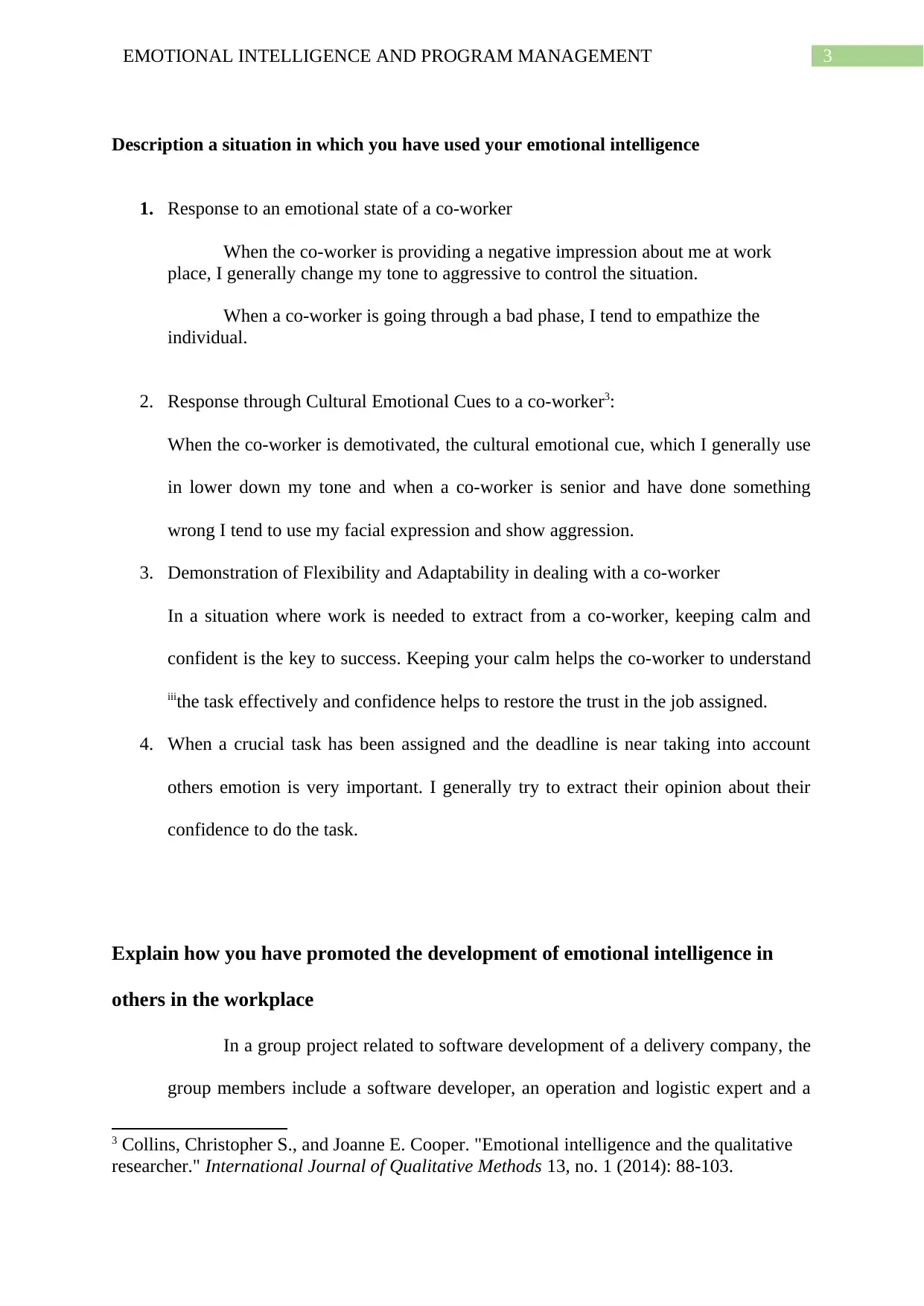
3EMOTIONAL INTELLIGENCE AND PROGRAM MANAGEMENT
Description a situation in which you have used your emotional intelligence
1. Response to an emotional state of a co-worker
When the co-worker is providing a negative impression about me at work
place, I generally change my tone to aggressive to control the situation.
When a co-worker is going through a bad phase, I tend to empathize the
individual.
2. Response through Cultural Emotional Cues to a co-worker3:
When the co-worker is demotivated, the cultural emotional cue, which I generally use
in lower down my tone and when a co-worker is senior and have done something
wrong I tend to use my facial expression and show aggression.
3. Demonstration of Flexibility and Adaptability in dealing with a co-worker
In a situation where work is needed to extract from a co-worker, keeping calm and
confident is the key to success. Keeping your calm helps the co-worker to understand
iiithe task effectively and confidence helps to restore the trust in the job assigned.
4. When a crucial task has been assigned and the deadline is near taking into account
others emotion is very important. I generally try to extract their opinion about their
confidence to do the task.
Explain how you have promoted the development of emotional intelligence in
others in the workplace
In a group project related to software development of a delivery company, the
group members include a software developer, an operation and logistic expert and a
3 Collins, Christopher S., and Joanne E. Cooper. "Emotional intelligence and the qualitative
researcher." International Journal of Qualitative Methods 13, no. 1 (2014): 88-103.
Description a situation in which you have used your emotional intelligence
1. Response to an emotional state of a co-worker
When the co-worker is providing a negative impression about me at work
place, I generally change my tone to aggressive to control the situation.
When a co-worker is going through a bad phase, I tend to empathize the
individual.
2. Response through Cultural Emotional Cues to a co-worker3:
When the co-worker is demotivated, the cultural emotional cue, which I generally use
in lower down my tone and when a co-worker is senior and have done something
wrong I tend to use my facial expression and show aggression.
3. Demonstration of Flexibility and Adaptability in dealing with a co-worker
In a situation where work is needed to extract from a co-worker, keeping calm and
confident is the key to success. Keeping your calm helps the co-worker to understand
iiithe task effectively and confidence helps to restore the trust in the job assigned.
4. When a crucial task has been assigned and the deadline is near taking into account
others emotion is very important. I generally try to extract their opinion about their
confidence to do the task.
Explain how you have promoted the development of emotional intelligence in
others in the workplace
In a group project related to software development of a delivery company, the
group members include a software developer, an operation and logistic expert and a
3 Collins, Christopher S., and Joanne E. Cooper. "Emotional intelligence and the qualitative
researcher." International Journal of Qualitative Methods 13, no. 1 (2014): 88-103.
Paraphrase This Document
Need a fresh take? Get an instant paraphrase of this document with our AI Paraphraser
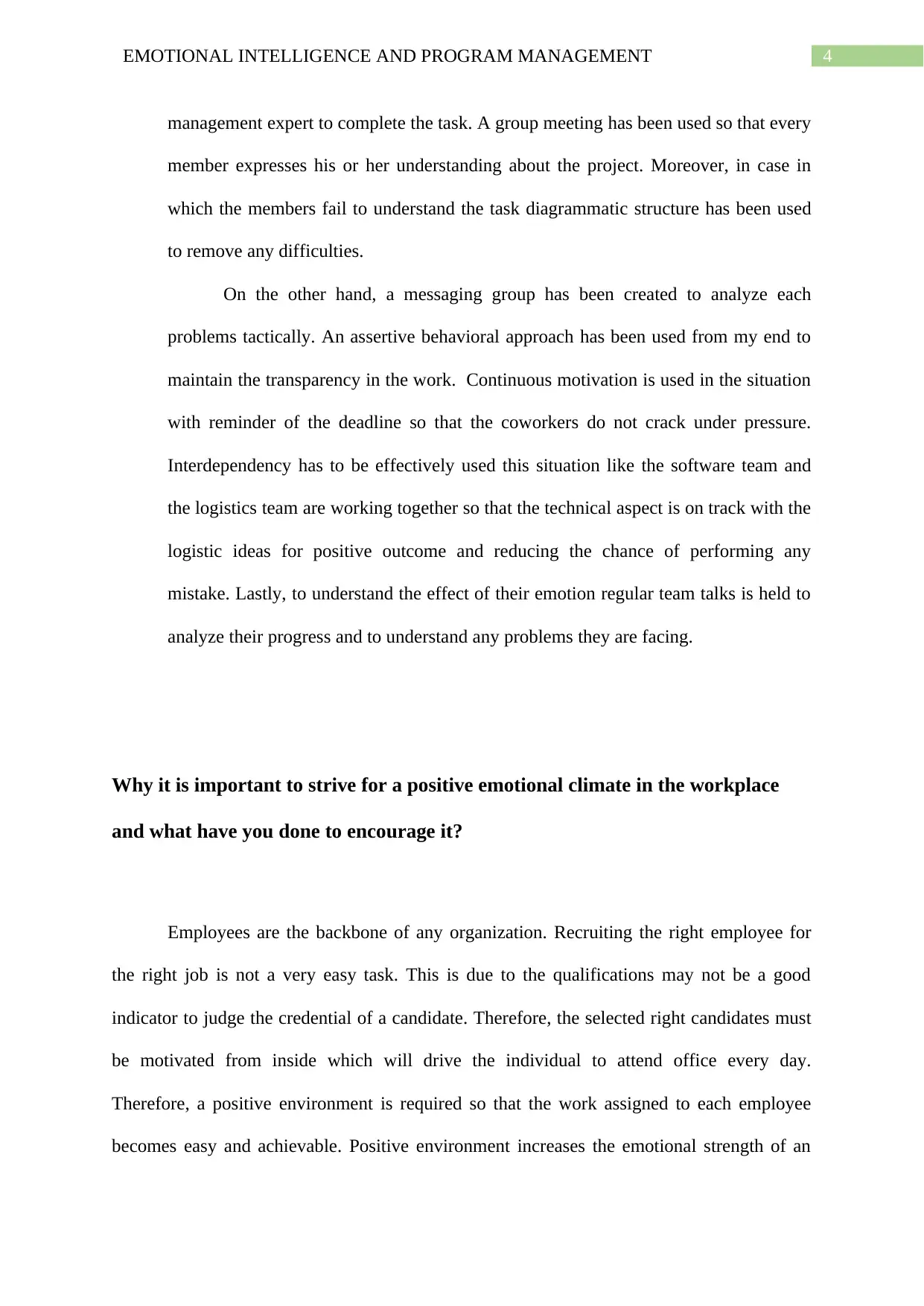
4EMOTIONAL INTELLIGENCE AND PROGRAM MANAGEMENT
management expert to complete the task. A group meeting has been used so that every
member expresses his or her understanding about the project. Moreover, in case in
which the members fail to understand the task diagrammatic structure has been used
to remove any difficulties.
On the other hand, a messaging group has been created to analyze each
problems tactically. An assertive behavioral approach has been used from my end to
maintain the transparency in the work. Continuous motivation is used in the situation
with reminder of the deadline so that the coworkers do not crack under pressure.
Interdependency has to be effectively used this situation like the software team and
the logistics team are working together so that the technical aspect is on track with the
logistic ideas for positive outcome and reducing the chance of performing any
mistake. Lastly, to understand the effect of their emotion regular team talks is held to
analyze their progress and to understand any problems they are facing.
Why it is important to strive for a positive emotional climate in the workplace
and what have you done to encourage it?
Employees are the backbone of any organization. Recruiting the right employee for
the right job is not a very easy task. This is due to the qualifications may not be a good
indicator to judge the credential of a candidate. Therefore, the selected right candidates must
be motivated from inside which will drive the individual to attend office every day.
Therefore, a positive environment is required so that the work assigned to each employee
becomes easy and achievable. Positive environment increases the emotional strength of an
management expert to complete the task. A group meeting has been used so that every
member expresses his or her understanding about the project. Moreover, in case in
which the members fail to understand the task diagrammatic structure has been used
to remove any difficulties.
On the other hand, a messaging group has been created to analyze each
problems tactically. An assertive behavioral approach has been used from my end to
maintain the transparency in the work. Continuous motivation is used in the situation
with reminder of the deadline so that the coworkers do not crack under pressure.
Interdependency has to be effectively used this situation like the software team and
the logistics team are working together so that the technical aspect is on track with the
logistic ideas for positive outcome and reducing the chance of performing any
mistake. Lastly, to understand the effect of their emotion regular team talks is held to
analyze their progress and to understand any problems they are facing.
Why it is important to strive for a positive emotional climate in the workplace
and what have you done to encourage it?
Employees are the backbone of any organization. Recruiting the right employee for
the right job is not a very easy task. This is due to the qualifications may not be a good
indicator to judge the credential of a candidate. Therefore, the selected right candidates must
be motivated from inside which will drive the individual to attend office every day.
Therefore, a positive environment is required so that the work assigned to each employee
becomes easy and achievable. Positive environment increases the emotional strength of an
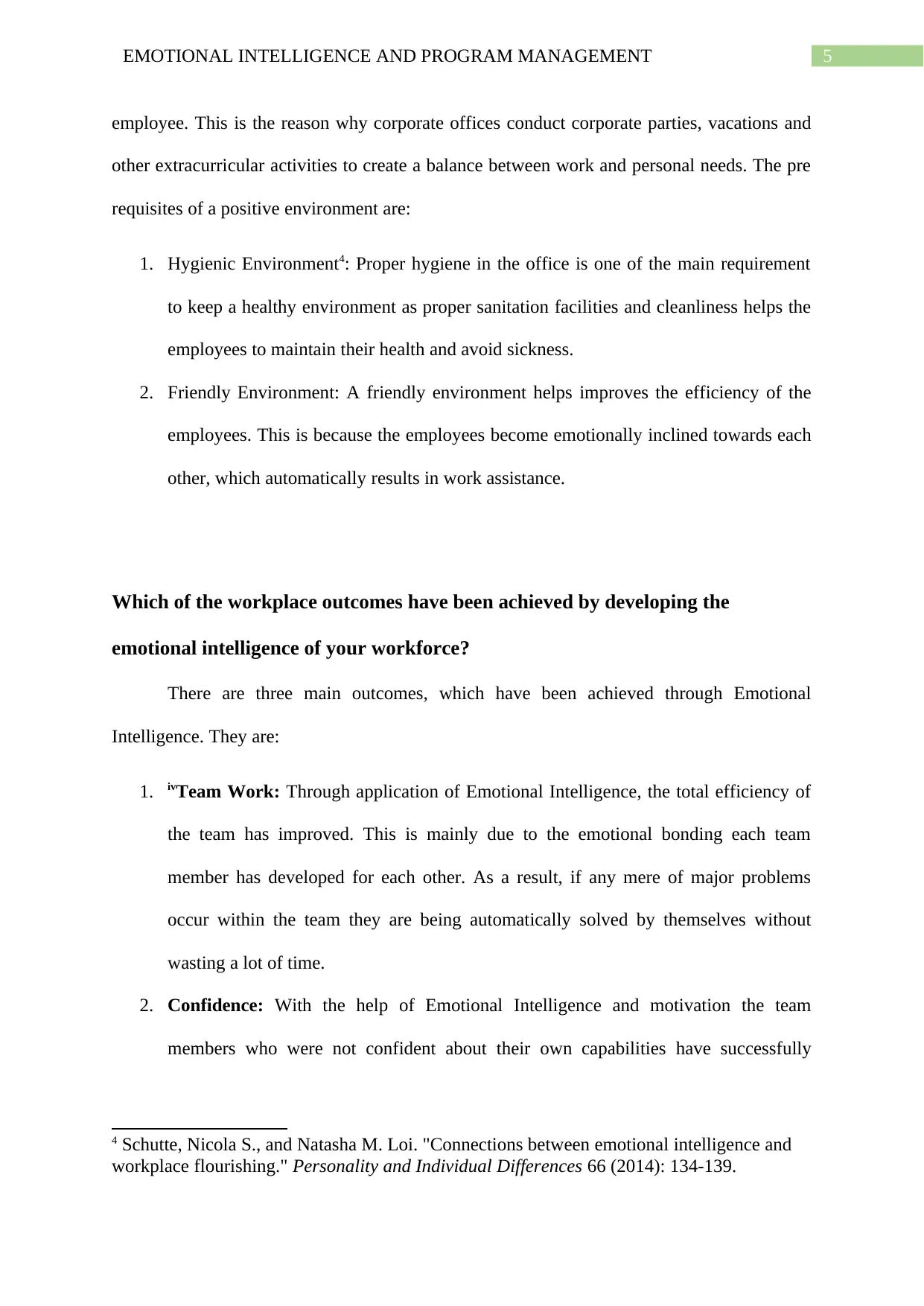
5EMOTIONAL INTELLIGENCE AND PROGRAM MANAGEMENT
employee. This is the reason why corporate offices conduct corporate parties, vacations and
other extracurricular activities to create a balance between work and personal needs. The pre
requisites of a positive environment are:
1. Hygienic Environment4: Proper hygiene in the office is one of the main requirement
to keep a healthy environment as proper sanitation facilities and cleanliness helps the
employees to maintain their health and avoid sickness.
2. Friendly Environment: A friendly environment helps improves the efficiency of the
employees. This is because the employees become emotionally inclined towards each
other, which automatically results in work assistance.
Which of the workplace outcomes have been achieved by developing the
emotional intelligence of your workforce?
There are three main outcomes, which have been achieved through Emotional
Intelligence. They are:
1. ivTeam Work: Through application of Emotional Intelligence, the total efficiency of
the team has improved. This is mainly due to the emotional bonding each team
member has developed for each other. As a result, if any mere of major problems
occur within the team they are being automatically solved by themselves without
wasting a lot of time.
2. Confidence: With the help of Emotional Intelligence and motivation the team
members who were not confident about their own capabilities have successfully
4 Schutte, Nicola S., and Natasha M. Loi. "Connections between emotional intelligence and
workplace flourishing." Personality and Individual Differences 66 (2014): 134-139.
employee. This is the reason why corporate offices conduct corporate parties, vacations and
other extracurricular activities to create a balance between work and personal needs. The pre
requisites of a positive environment are:
1. Hygienic Environment4: Proper hygiene in the office is one of the main requirement
to keep a healthy environment as proper sanitation facilities and cleanliness helps the
employees to maintain their health and avoid sickness.
2. Friendly Environment: A friendly environment helps improves the efficiency of the
employees. This is because the employees become emotionally inclined towards each
other, which automatically results in work assistance.
Which of the workplace outcomes have been achieved by developing the
emotional intelligence of your workforce?
There are three main outcomes, which have been achieved through Emotional
Intelligence. They are:
1. ivTeam Work: Through application of Emotional Intelligence, the total efficiency of
the team has improved. This is mainly due to the emotional bonding each team
member has developed for each other. As a result, if any mere of major problems
occur within the team they are being automatically solved by themselves without
wasting a lot of time.
2. Confidence: With the help of Emotional Intelligence and motivation the team
members who were not confident about their own capabilities have successfully
4 Schutte, Nicola S., and Natasha M. Loi. "Connections between emotional intelligence and
workplace flourishing." Personality and Individual Differences 66 (2014): 134-139.
⊘ This is a preview!⊘
Do you want full access?
Subscribe today to unlock all pages.

Trusted by 1+ million students worldwide
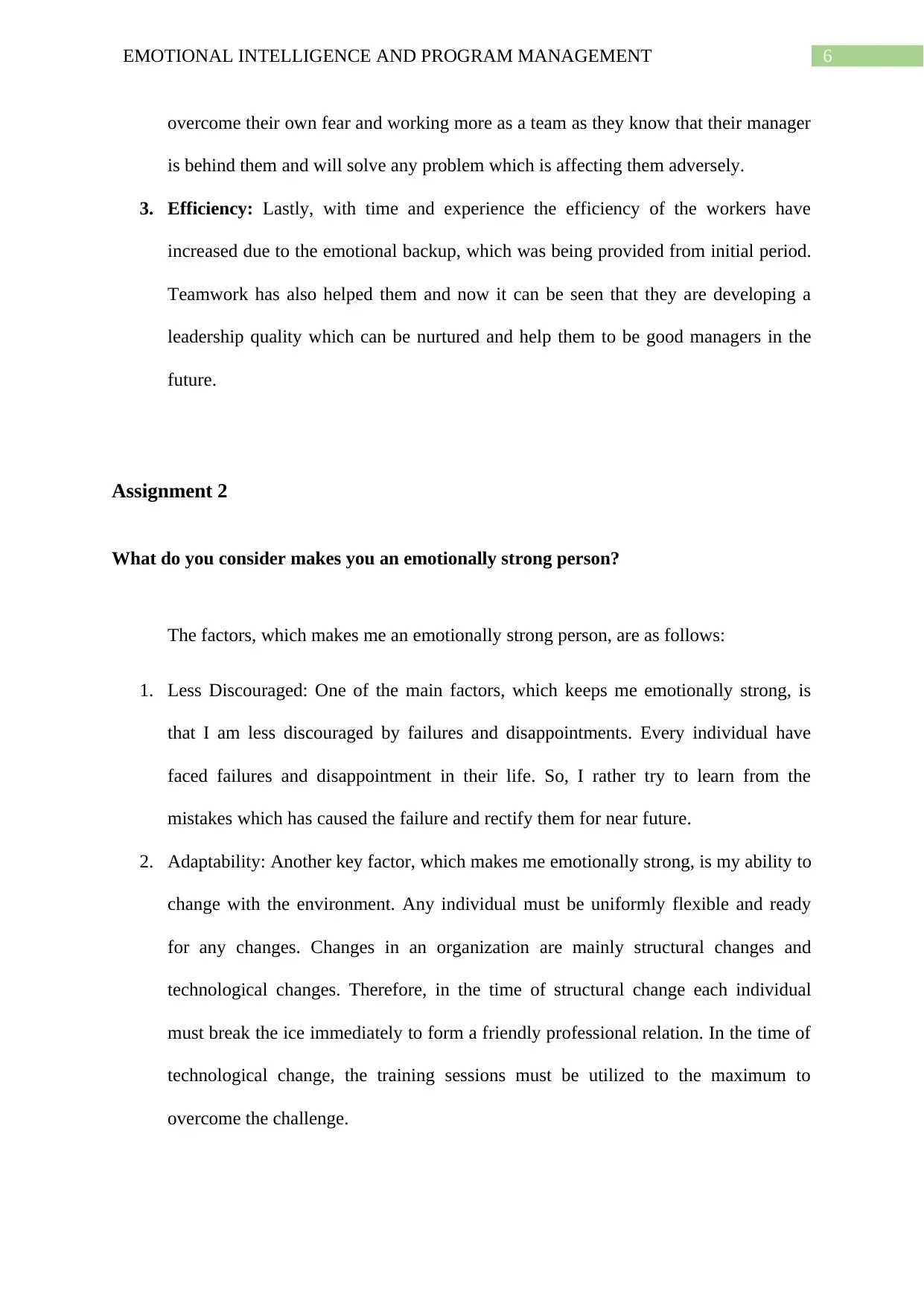
6EMOTIONAL INTELLIGENCE AND PROGRAM MANAGEMENT
overcome their own fear and working more as a team as they know that their manager
is behind them and will solve any problem which is affecting them adversely.
3. Efficiency: Lastly, with time and experience the efficiency of the workers have
increased due to the emotional backup, which was being provided from initial period.
Teamwork has also helped them and now it can be seen that they are developing a
leadership quality which can be nurtured and help them to be good managers in the
future.
Assignment 2
What do you consider makes you an emotionally strong person?
The factors, which makes me an emotionally strong person, are as follows:
1. Less Discouraged: One of the main factors, which keeps me emotionally strong, is
that I am less discouraged by failures and disappointments. Every individual have
faced failures and disappointment in their life. So, I rather try to learn from the
mistakes which has caused the failure and rectify them for near future.
2. Adaptability: Another key factor, which makes me emotionally strong, is my ability to
change with the environment. Any individual must be uniformly flexible and ready
for any changes. Changes in an organization are mainly structural changes and
technological changes. Therefore, in the time of structural change each individual
must break the ice immediately to form a friendly professional relation. In the time of
technological change, the training sessions must be utilized to the maximum to
overcome the challenge.
overcome their own fear and working more as a team as they know that their manager
is behind them and will solve any problem which is affecting them adversely.
3. Efficiency: Lastly, with time and experience the efficiency of the workers have
increased due to the emotional backup, which was being provided from initial period.
Teamwork has also helped them and now it can be seen that they are developing a
leadership quality which can be nurtured and help them to be good managers in the
future.
Assignment 2
What do you consider makes you an emotionally strong person?
The factors, which makes me an emotionally strong person, are as follows:
1. Less Discouraged: One of the main factors, which keeps me emotionally strong, is
that I am less discouraged by failures and disappointments. Every individual have
faced failures and disappointment in their life. So, I rather try to learn from the
mistakes which has caused the failure and rectify them for near future.
2. Adaptability: Another key factor, which makes me emotionally strong, is my ability to
change with the environment. Any individual must be uniformly flexible and ready
for any changes. Changes in an organization are mainly structural changes and
technological changes. Therefore, in the time of structural change each individual
must break the ice immediately to form a friendly professional relation. In the time of
technological change, the training sessions must be utilized to the maximum to
overcome the challenge.
Paraphrase This Document
Need a fresh take? Get an instant paraphrase of this document with our AI Paraphraser
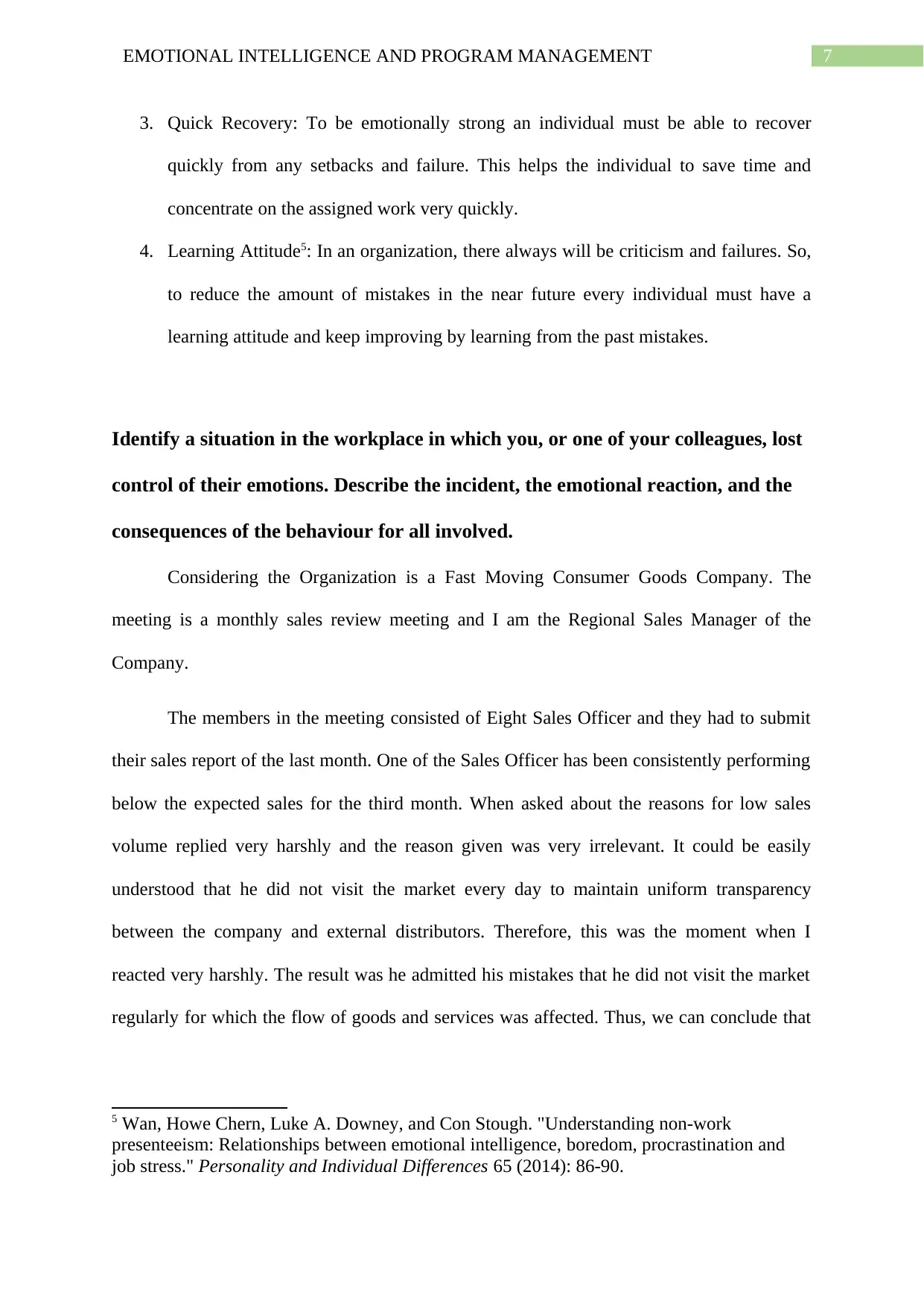
7EMOTIONAL INTELLIGENCE AND PROGRAM MANAGEMENT
3. Quick Recovery: To be emotionally strong an individual must be able to recover
quickly from any setbacks and failure. This helps the individual to save time and
concentrate on the assigned work very quickly.
4. Learning Attitude5: In an organization, there always will be criticism and failures. So,
to reduce the amount of mistakes in the near future every individual must have a
learning attitude and keep improving by learning from the past mistakes.
Identify a situation in the workplace in which you, or one of your colleagues, lost
control of their emotions. Describe the incident, the emotional reaction, and the
consequences of the behaviour for all involved.
Considering the Organization is a Fast Moving Consumer Goods Company. The
meeting is a monthly sales review meeting and I am the Regional Sales Manager of the
Company.
The members in the meeting consisted of Eight Sales Officer and they had to submit
their sales report of the last month. One of the Sales Officer has been consistently performing
below the expected sales for the third month. When asked about the reasons for low sales
volume replied very harshly and the reason given was very irrelevant. It could be easily
understood that he did not visit the market every day to maintain uniform transparency
between the company and external distributors. Therefore, this was the moment when I
reacted very harshly. The result was he admitted his mistakes that he did not visit the market
regularly for which the flow of goods and services was affected. Thus, we can conclude that
5 Wan, Howe Chern, Luke A. Downey, and Con Stough. "Understanding non-work
presenteeism: Relationships between emotional intelligence, boredom, procrastination and
job stress." Personality and Individual Differences 65 (2014): 86-90.
3. Quick Recovery: To be emotionally strong an individual must be able to recover
quickly from any setbacks and failure. This helps the individual to save time and
concentrate on the assigned work very quickly.
4. Learning Attitude5: In an organization, there always will be criticism and failures. So,
to reduce the amount of mistakes in the near future every individual must have a
learning attitude and keep improving by learning from the past mistakes.
Identify a situation in the workplace in which you, or one of your colleagues, lost
control of their emotions. Describe the incident, the emotional reaction, and the
consequences of the behaviour for all involved.
Considering the Organization is a Fast Moving Consumer Goods Company. The
meeting is a monthly sales review meeting and I am the Regional Sales Manager of the
Company.
The members in the meeting consisted of Eight Sales Officer and they had to submit
their sales report of the last month. One of the Sales Officer has been consistently performing
below the expected sales for the third month. When asked about the reasons for low sales
volume replied very harshly and the reason given was very irrelevant. It could be easily
understood that he did not visit the market every day to maintain uniform transparency
between the company and external distributors. Therefore, this was the moment when I
reacted very harshly. The result was he admitted his mistakes that he did not visit the market
regularly for which the flow of goods and services was affected. Thus, we can conclude that
5 Wan, Howe Chern, Luke A. Downey, and Con Stough. "Understanding non-work
presenteeism: Relationships between emotional intelligence, boredom, procrastination and
job stress." Personality and Individual Differences 65 (2014): 86-90.
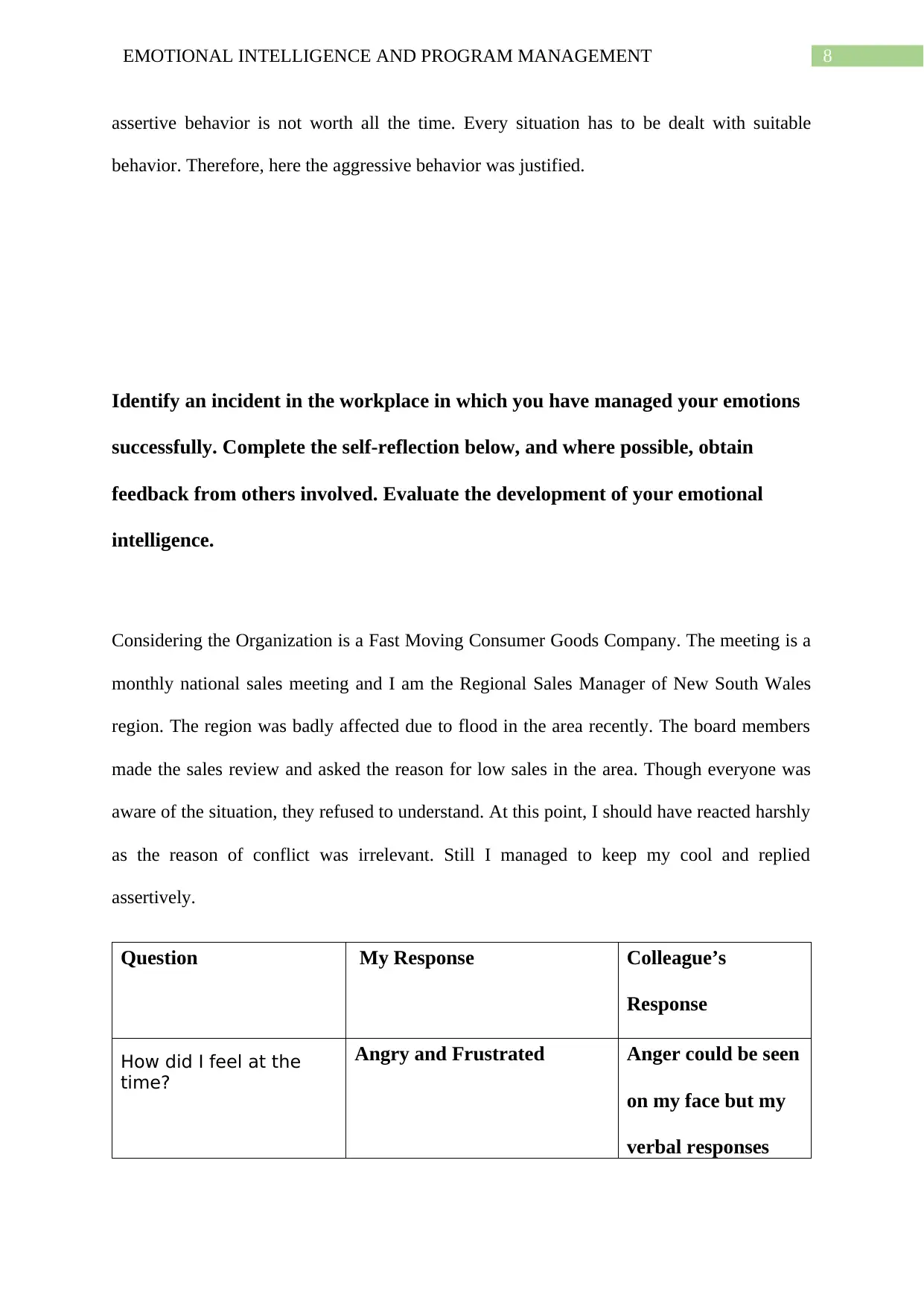
8EMOTIONAL INTELLIGENCE AND PROGRAM MANAGEMENT
assertive behavior is not worth all the time. Every situation has to be dealt with suitable
behavior. Therefore, here the aggressive behavior was justified.
Identify an incident in the workplace in which you have managed your emotions
successfully. Complete the self-reflection below, and where possible, obtain
feedback from others involved. Evaluate the development of your emotional
intelligence.
Considering the Organization is a Fast Moving Consumer Goods Company. The meeting is a
monthly national sales meeting and I am the Regional Sales Manager of New South Wales
region. The region was badly affected due to flood in the area recently. The board members
made the sales review and asked the reason for low sales in the area. Though everyone was
aware of the situation, they refused to understand. At this point, I should have reacted harshly
as the reason of conflict was irrelevant. Still I managed to keep my cool and replied
assertively.
Question My Response Colleague’s
Response
How did I feel at the
time?
Angry and Frustrated Anger could be seen
on my face but my
verbal responses
assertive behavior is not worth all the time. Every situation has to be dealt with suitable
behavior. Therefore, here the aggressive behavior was justified.
Identify an incident in the workplace in which you have managed your emotions
successfully. Complete the self-reflection below, and where possible, obtain
feedback from others involved. Evaluate the development of your emotional
intelligence.
Considering the Organization is a Fast Moving Consumer Goods Company. The meeting is a
monthly national sales meeting and I am the Regional Sales Manager of New South Wales
region. The region was badly affected due to flood in the area recently. The board members
made the sales review and asked the reason for low sales in the area. Though everyone was
aware of the situation, they refused to understand. At this point, I should have reacted harshly
as the reason of conflict was irrelevant. Still I managed to keep my cool and replied
assertively.
Question My Response Colleague’s
Response
How did I feel at the
time?
Angry and Frustrated Anger could be seen
on my face but my
verbal responses
⊘ This is a preview!⊘
Do you want full access?
Subscribe today to unlock all pages.

Trusted by 1+ million students worldwide
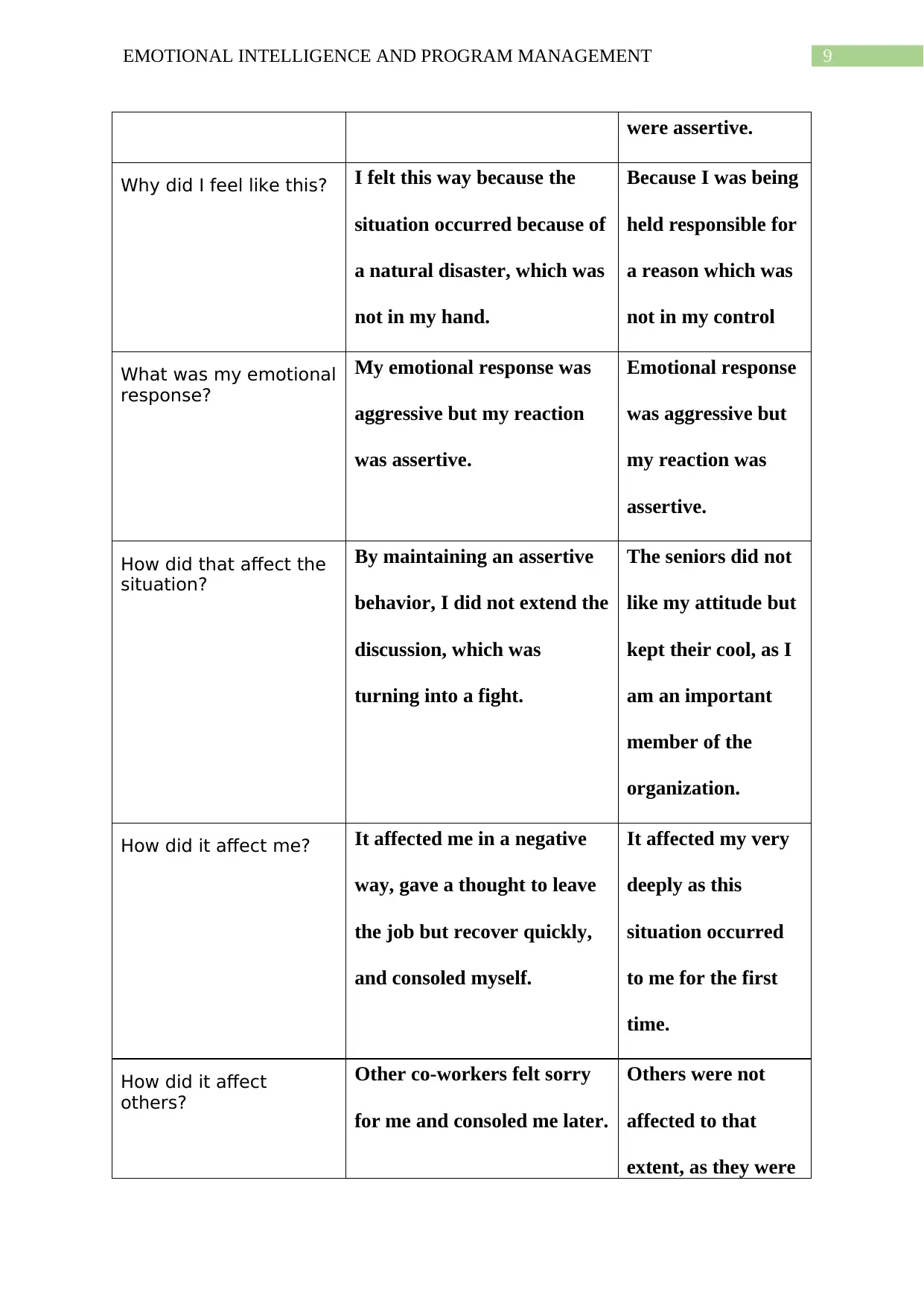
9EMOTIONAL INTELLIGENCE AND PROGRAM MANAGEMENT
were assertive.
Why did I feel like this? I felt this way because the
situation occurred because of
a natural disaster, which was
not in my hand.
Because I was being
held responsible for
a reason which was
not in my control
What was my emotional
response?
My emotional response was
aggressive but my reaction
was assertive.
Emotional response
was aggressive but
my reaction was
assertive.
How did that affect the
situation?
By maintaining an assertive
behavior, I did not extend the
discussion, which was
turning into a fight.
The seniors did not
like my attitude but
kept their cool, as I
am an important
member of the
organization.
How did it affect me? It affected me in a negative
way, gave a thought to leave
the job but recover quickly,
and consoled myself.
It affected my very
deeply as this
situation occurred
to me for the first
time.
How did it affect
others?
Other co-workers felt sorry
for me and consoled me later.
Others were not
affected to that
extent, as they were
were assertive.
Why did I feel like this? I felt this way because the
situation occurred because of
a natural disaster, which was
not in my hand.
Because I was being
held responsible for
a reason which was
not in my control
What was my emotional
response?
My emotional response was
aggressive but my reaction
was assertive.
Emotional response
was aggressive but
my reaction was
assertive.
How did that affect the
situation?
By maintaining an assertive
behavior, I did not extend the
discussion, which was
turning into a fight.
The seniors did not
like my attitude but
kept their cool, as I
am an important
member of the
organization.
How did it affect me? It affected me in a negative
way, gave a thought to leave
the job but recover quickly,
and consoled myself.
It affected my very
deeply as this
situation occurred
to me for the first
time.
How did it affect
others?
Other co-workers felt sorry
for me and consoled me later.
Others were not
affected to that
extent, as they were
Paraphrase This Document
Need a fresh take? Get an instant paraphrase of this document with our AI Paraphraser
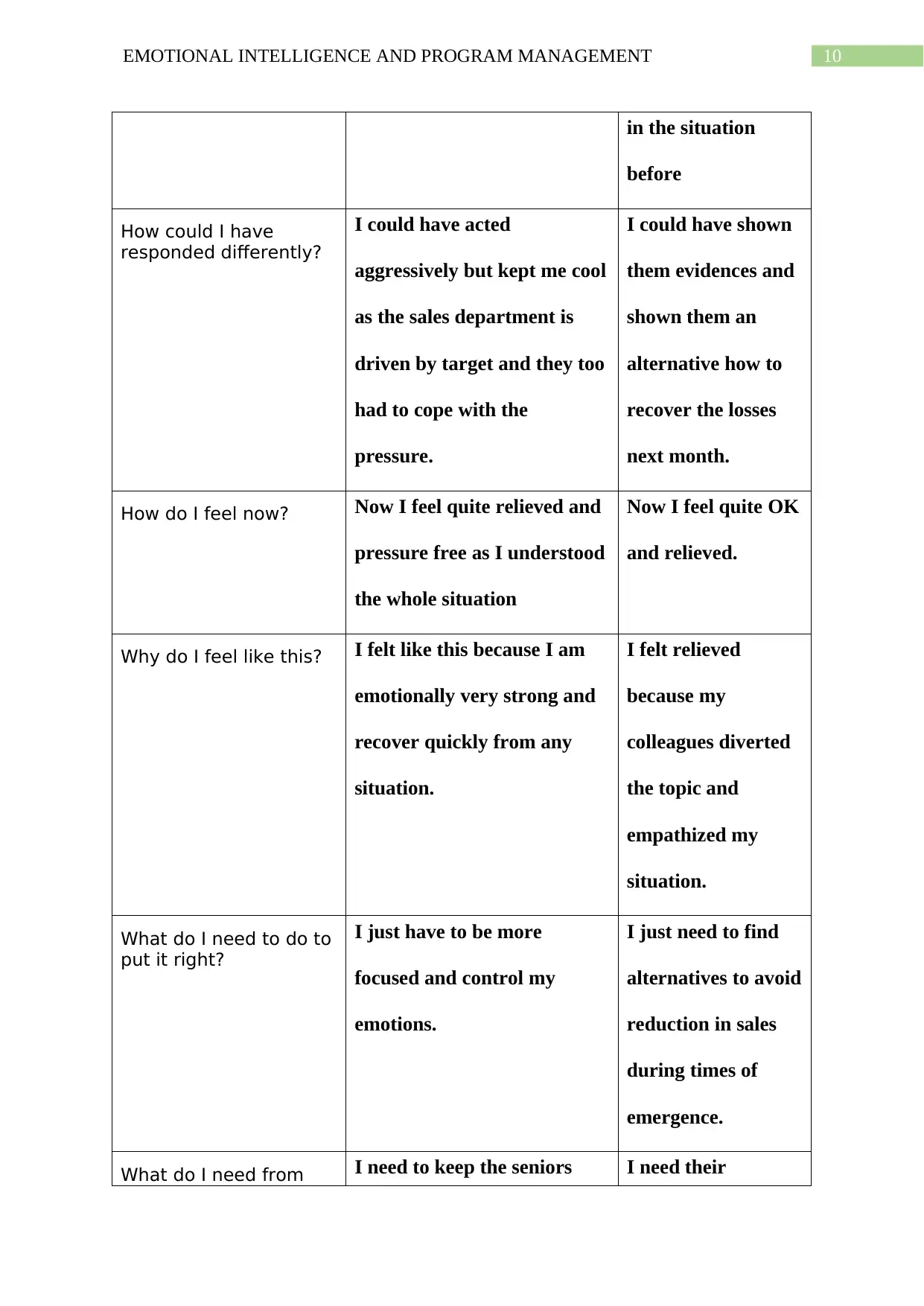
10EMOTIONAL INTELLIGENCE AND PROGRAM MANAGEMENT
in the situation
before
How could I have
responded differently?
I could have acted
aggressively but kept me cool
as the sales department is
driven by target and they too
had to cope with the
pressure.
I could have shown
them evidences and
shown them an
alternative how to
recover the losses
next month.
How do I feel now? Now I feel quite relieved and
pressure free as I understood
the whole situation
Now I feel quite OK
and relieved.
Why do I feel like this? I felt like this because I am
emotionally very strong and
recover quickly from any
situation.
I felt relieved
because my
colleagues diverted
the topic and
empathized my
situation.
What do I need to do to
put it right?
I just have to be more
focused and control my
emotions.
I just need to find
alternatives to avoid
reduction in sales
during times of
emergence.
What do I need from I need to keep the seniors I need their
in the situation
before
How could I have
responded differently?
I could have acted
aggressively but kept me cool
as the sales department is
driven by target and they too
had to cope with the
pressure.
I could have shown
them evidences and
shown them an
alternative how to
recover the losses
next month.
How do I feel now? Now I feel quite relieved and
pressure free as I understood
the whole situation
Now I feel quite OK
and relieved.
Why do I feel like this? I felt like this because I am
emotionally very strong and
recover quickly from any
situation.
I felt relieved
because my
colleagues diverted
the topic and
empathized my
situation.
What do I need to do to
put it right?
I just have to be more
focused and control my
emotions.
I just need to find
alternatives to avoid
reduction in sales
during times of
emergence.
What do I need from I need to keep the seniors I need their
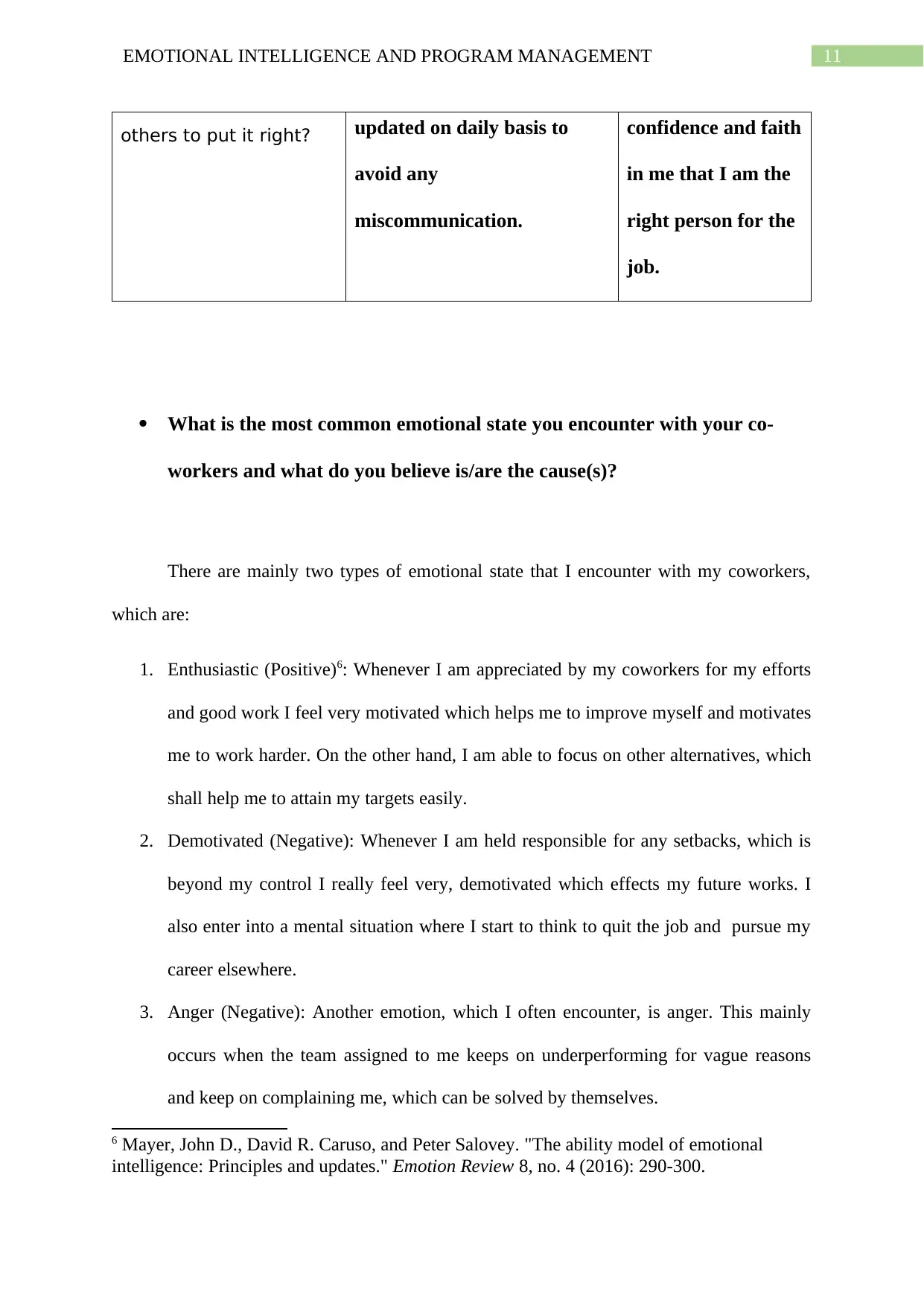
11EMOTIONAL INTELLIGENCE AND PROGRAM MANAGEMENT
others to put it right? updated on daily basis to
avoid any
miscommunication.
confidence and faith
in me that I am the
right person for the
job.
What is the most common emotional state you encounter with your co-
workers and what do you believe is/are the cause(s)?
There are mainly two types of emotional state that I encounter with my coworkers,
which are:
1. Enthusiastic (Positive)6: Whenever I am appreciated by my coworkers for my efforts
and good work I feel very motivated which helps me to improve myself and motivates
me to work harder. On the other hand, I am able to focus on other alternatives, which
shall help me to attain my targets easily.
2. Demotivated (Negative): Whenever I am held responsible for any setbacks, which is
beyond my control I really feel very, demotivated which effects my future works. I
also enter into a mental situation where I start to think to quit the job and pursue my
career elsewhere.
3. Anger (Negative): Another emotion, which I often encounter, is anger. This mainly
occurs when the team assigned to me keeps on underperforming for vague reasons
and keep on complaining me, which can be solved by themselves.
6 Mayer, John D., David R. Caruso, and Peter Salovey. "The ability model of emotional
intelligence: Principles and updates." Emotion Review 8, no. 4 (2016): 290-300.
others to put it right? updated on daily basis to
avoid any
miscommunication.
confidence and faith
in me that I am the
right person for the
job.
What is the most common emotional state you encounter with your co-
workers and what do you believe is/are the cause(s)?
There are mainly two types of emotional state that I encounter with my coworkers,
which are:
1. Enthusiastic (Positive)6: Whenever I am appreciated by my coworkers for my efforts
and good work I feel very motivated which helps me to improve myself and motivates
me to work harder. On the other hand, I am able to focus on other alternatives, which
shall help me to attain my targets easily.
2. Demotivated (Negative): Whenever I am held responsible for any setbacks, which is
beyond my control I really feel very, demotivated which effects my future works. I
also enter into a mental situation where I start to think to quit the job and pursue my
career elsewhere.
3. Anger (Negative): Another emotion, which I often encounter, is anger. This mainly
occurs when the team assigned to me keeps on underperforming for vague reasons
and keep on complaining me, which can be solved by themselves.
6 Mayer, John D., David R. Caruso, and Peter Salovey. "The ability model of emotional
intelligence: Principles and updates." Emotion Review 8, no. 4 (2016): 290-300.
⊘ This is a preview!⊘
Do you want full access?
Subscribe today to unlock all pages.

Trusted by 1+ million students worldwide
1 out of 19
Your All-in-One AI-Powered Toolkit for Academic Success.
+13062052269
info@desklib.com
Available 24*7 on WhatsApp / Email
![[object Object]](/_next/static/media/star-bottom.7253800d.svg)
Unlock your academic potential
Copyright © 2020–2026 A2Z Services. All Rights Reserved. Developed and managed by ZUCOL.